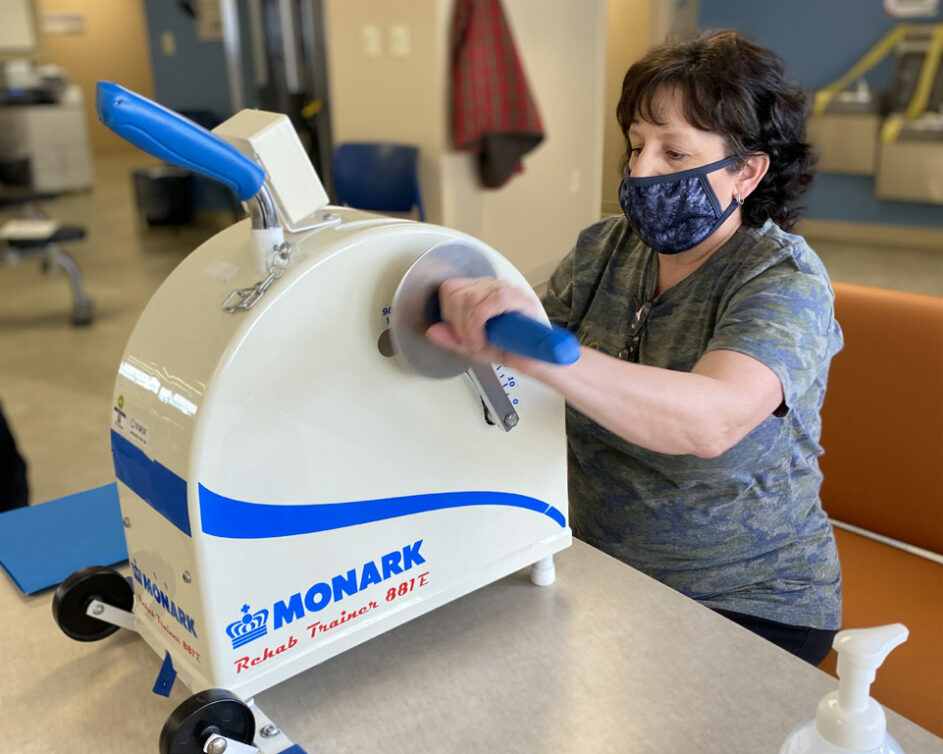It started with a sleepless night. It was February 2021, and Connie Smith assumed she was restless because of grief and distress. Her mother had passed away the day before.
Finally realizing something was very wrong but unable to pinpoint exactly what it might be, Smith went to a hospital for help and learned she had Covid-19.
“I had no underlying health issues, I had no respiratory issues, I’ve never smoked, and yet I got Covid in a severe way,” Smith says. “I will tell you that when I walked in the emergency room that day, I did not think I would come home from the hospital.”
The thought that her children might lose their mother so soon after losing their grandmother was devastating.
With care and prayer, Smith was able to leave the hospital about a week later, but the effects of Covid and pneumonia would stay with her for five long and lonely months. She had been energetic, active and social, but after Covid she was weak and in a world apart from the life she loved.
“Covid is not just a physical ailment,” Smith says. “It takes its toll on you emotionally.”
A Post-Pandemic Society
Smith is one of a growing number of people having survived severe cases of Covid, but left to cope with the emotional impact of a lengthy isolation, a long recovery and long-term effects. With vocal chords damaged from months of intense coughing and still dealing with bouts of fatigue and side effects from medicine, Smith is focusing instead on how far she’s come and what steps she can take next steps to keep improving her quality of life one day at a time. An important step has been pulmonary rehab at Fort Sanders Cardiopulmonary Rehabilitation.
“Pulmonary rehab has made all the difference for me,” Smith says. “When I come here and I get better, it makes me better at home. I’m a better parent, I’m a better partner, I’m a better sibling. … When you start to improve you can become better in all the areas you need to be better in.”
Fort Sanders Cardiopulmonary Rehabilitation is a medically supervised program that helps rebuild strength and stamina in patients whose lungs and hearts are challenged by conditions beyond their control. Covid has brought a new type of patient into the program, and they find compassionate care and emotional support after their bodies have been battered by the virus.
Smith was on oxygen full time and barely able to go the equivalent of 700 feet in an initial six-minute test walk. After her last prescribed session, she could go 1,100 feet without the help of an oxygen tank, and now only uses oxygen at night.
“For a lot of our patients this is new and it’s scary, and they have no idea what to expect, especially people who’ve been healthy all their lives,” says exercise physiologist Emily Hunley. “That first six-minute walk test is a baseline, but a lot of times it is a struggle.”
Moving Forward

Exercise physiologist Emily Hunley works with Connie Smith
Smith has moved into a maintenance program where she pays an out-of-pocket fee to keep using the facilities and equipment under the continued supervision of medical personnel.
“We still check blood pressure and oxygen saturation for the patients on maintenance, and we’re here for an emergency situation, which is what makes this maintenance exercise safe,” Hunley says.
But for Smith it’s not just about her own recovery. She makes a concerted effort to encourage other Covid survivors she meets at rehab. Counting herself blessed by encouragement from family, friends, prayer warriors and work associates, Smith is aware many survivors don’t have that level of support.
Smith lets them know it’s important to have a shift in mindset, from trying to get back to “normal” to accepting the long-term effects of Covid, and moving forward with pulmonary rehabilitation and an attitude of gratitude.
“I don’t know if I will ever be back where I was before, but I am moving forward, and that’s the goal – to continue to move forward,” Smith says. “I’m just thankful to be a survivor, and I’ll take whatever comes with it.”
Medically Supervised, Safe and Supportive
At Fort Sanders Cardiopulmonary Rehabilitation, personalized exercise plans are developed to help pulmonary patients breathe more freely and regain strength. The exercises are guided by specially trained medical staff and overseen by physicians.
Patients wear heart monitors, and oxygen levels and blood pressure are checked regularly. Exercise intensity is built safely and gradually, which builds the patients’ confidence along the way.
Patients in the program can learn about healthy eating and how to reduce risk factors from heart and lung diseases. A pharmacist helps make sure the patients are getting the right medications in the right dosages. The program also offers a unique kind of support for a new kind of patient.
Hunley says physical, mental and emotional well-being are all connected, and the support patients receive can motivate them to keep coming back and reaping the benefits of medically supervised exercise.
Fort Sanders’ outpatient pulmonary rehabilitation program is one of the first to receive national certification by the American Association of Cardiovascular and Pulmonary Rehabilitation for consistent clinical outcomes in lung patients. The rehab program is available for heart and lung patients who have a physician referral. Learn more here.
Information provided by Covenant Health.

